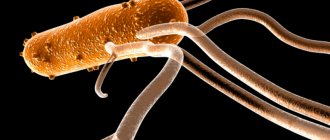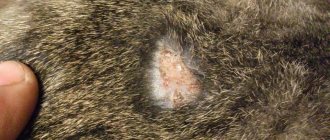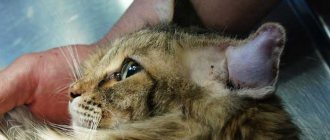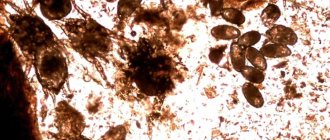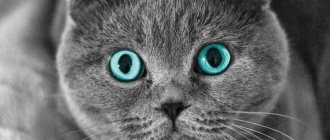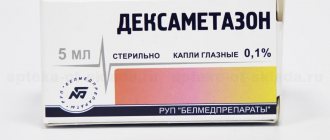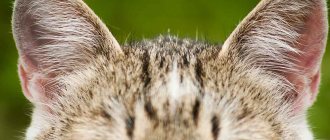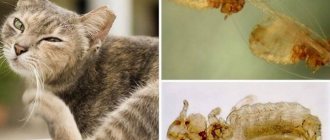Coronavirus gastroenteritis disease concept
Coronavirus gastroenteritis is a hemorrhagic inflammation of the gastrointestinal tract due to infection of a pet with the FCoV virus. This is a common disease in cats, which is explained by the high probability of infection and the fact that many domestic animals (dogs, pigs) and humans can be carriers of pathogenic microorganisms.
Feline coronavirus under a microscope
The causative agent of coronavirus
It is useful for every owner of a four-legged pet to learn about a very common disease among dogs - coronavirus enteritis.
As a result of infection with coronavirus, intestinal inflammation, dehydration and fatal exhaustion of the body occur. With severe development of the disease, almost all organs of the animal are affected. Experts drew attention to this disease in the late 70s. Currently, methods for treating this dangerous viral disease have been successfully developed. Frequently asked questions from pet owners
Can a dog infected with coronavirus infect a person?
The virus of the coronavirus family in dogs is not related to the human coronavirus, but has antigenic similarity to the coronavirus of domestic cats and can infect them through household contact. This coronavirus pathogen persists in the animal’s feces at a temperature of 18-20 degrees for no more than 48 hours.
Coronavirus enteritis should not be confused with parvovirus enteritis. The last form of the insidious disease has more severe consequences for the dog’s body, which can be fatal.
It is important to know!
Dogs of all ages are susceptible to coronavirus enteritis.
However, those who fall into the following category are more likely to become infected than others:
- Weak immunity;
- Poor living conditions for the animal;
- Chronic infections.
For example, puppies under 10 months are at particular risk due to weak immunity and imperfect digestive system. At this age, during the acute course of coronavirus infection, death is most likely.
In this article we will talk about the causes of infection, symptoms, treatment and preventive measures against coronavirus enteritis in dogs.
Causes of enteritis infection
Even a dog owner who accidentally brought the virus on clothes or shoes can be a carrier of the infection. There are also other sources of coronavirus infection:
- Contact with sick animals: dogs, cats, pigs;
- Drinking contaminated water;
- Fecal-oral route.
Coronavirus infection often occurs in places where dogs gather in large numbers: at exhibitions, kennels, shelters. The virus itself lives in the animal’s feces for no more than two days. However, coronavirus is not dangerous for the owner and his family members. It is only transmitted to other animals.
Causes of infection
Coronavirus in cats: symptoms of infection and treatment
There are 2 ways coronavirus can enter a cat’s body:
- orally (through the mouth);
- nasally (through the nose).
The infectious agent is spread through particles of feces from a sick animal. It can remain viable in the external environment for up to a week, and in the body of a cat carrying the virus for up to a year, while its activation will begin from the moment suitable conditions for reproduction appear.
Pathologies most often affect cats under 2 years of age, as well as pets over 10 years of age. The risk of infection increases when pets are kept in large groups (at exhibitions, in shelters). If a cat is constantly at home and does not have contact with its relatives, the likelihood of contracting coronavirus gastroenteritis is minimal.
Prerequisites for active reproduction of the virus in the cat’s body:
- decreased immunity;
- eating disorders;
- severe stress;
- allergic reactions;
- therapy with antimicrobial medications that irritate the gastrointestinal mucosa;
- helminth infection;
- history of poisoning;
- congenital anomalies of the digestive organs.
In rare cases, a person can transmit coronavirus to a cat. This happens if feces from a sick animal gets on his clothes or hands.
What can trigger the disease?
Gastroenteritis often occurs against the background of an existing disease, and sometimes it is caused by negative external factors.
Diseases that provoke gastroenteritis:
- Meningitis.
- Pneumonia.
- Oncology and benign tumors.
- Coronavirus infection.
- Poisoning.
- Diseases of the pancreas.
- Addison's disease.
- Hyperthyroidism.
- Viral diseases.
- Escherichia coli.
- Salmonellosis.
- Intestinal volvulus.
- Pathological processes of the gastrointestinal tract, such as gastritis and pancreatitis.
- Intestinal obstruction.
- Liver diseases.
- Atherosclerosis.
- Heart diseases.
- Metabolic disorders.
- Worms.
External factors leading to gastroenteritis:
- Unbalanced diet.
- Lack of a stable pet feeding regimen.
- Binge eating.
- Poor-quality ready-made food that contains an excess of dyes and preservatives.
- Food allergies.
- Ingestion of a foreign body.
- Stressful situations.
- Excessive licking, leading to the formation of trichobezoars in the cat's stomach - hair balls made from ingested hair.
Infection process
Coronavirus is one of the most mysterious viruses known to science.
There are two strains of this pathogen found in cats: FIPV and FECV. The first of them causes infectious peritonitis, but the second is precisely the cause of infectious gastroenteritis.
As a rule, cats become infected by eating feces or sniffing them, and microscopic doses of the filler on which the causative agent has come into contact with the disease are sufficient for infection.
The virus persists in the external environment for quite a long time - up to a week, which makes it even more dangerous in terms of virulence.
There is no intrauterine transmission of the virus through the placenta. Moreover, as long as kittens receive antibodies from their mother cat’s milk, they do not get sick with coronavirus.
The “dangerous” age comes later - at 5-7 weeks, when passive immunity is already fading, and active immunity has not yet had time to develop. At this time, children are especially vulnerable and susceptible to infection with coronavirus.
But a particular danger to the health and life of cats is that the relatively harmless FECV, under the influence of certain, not fully studied factors, can mutate and turn into a deadly FIPV, causing infectious peritonitis, from which a lot of cats and, especially, kittens die. .
Important!
Even if the coronavirus has entered the cat’s body, this does not mean that it will certainly get sick. If the animal is healthy and has good immunity, then the coronavirus pathogen will be completely eliminated from its body. This process can take two weeks or several months.
For the cat itself, excretion of the pathogen along with feces is completely harmless, but at the same time it can infect other animals that have weaker immunity.
Is it transmitted to humans?
Both strains of feline coronavirus do not pose a danger to humans, and this applies to those with weakened immune systems, the elderly, and even newborn babies.
Therefore, if a cat in the family has contracted coronavirus gastroenteritis, one should not be afraid of infection and, especially, there is no need to euthanize or throw the animal outside for this reason.
Types of coronavirus gastroenteritis and their symptoms
Viral peritonitis in cats: symptoms and treatment
The virus, having penetrated the cat’s body, multiplies quickly, causing inflammation of the intestinal and stomach mucosa. Gastric functions are disrupted and gastritis develops. Symptoms depend on the form and severity of the pathology.
Infectious
Infectious peritonitis is caused by the FIPV virus. The pathogenic agent can spread throughout the pet’s body and negatively affect all organs and systems. There are 2 forms of the pathology: dry (develops slowly) and effusion (characterized by rapid multiplication of the virus and severe symptoms).
Exhausted cat
Symptoms of infectious coronavirus gastroenteritis:
- fever or, conversely, an abnormal decrease in body temperature;
- the cat refuses food, severe exhaustion;
- granulomatous formations in the abdominal cavity, inflammation of the lymph nodes, lesions of the central nervous system (dry form);
- decreased cat activity;
- dehydration due to frequent and profuse vomiting;
- diarrhea;
- formation of exudate in the abdominal or thoracic cavity, increase in abdominal volume (exudate form).
Non-infectious
Coronavirus FECV causes intestinal gastroenteritis in cats. This is a very contagious disease, but microorganisms have a low degree of pathogenicity, so the pathology does not develop into more dangerous forms. With good immunity in a cat, the virus is completely eliminated from the body, or the animal becomes a virus carrier.
As a rule, representatives of the cat family easily tolerate non-infectious coronavirus. In this case, the following symptoms are observed:
- too soft stools or diarrhea;
- blood or mucus in feces, pieces of undigested food;
- vomit.
Both infectious and non-infectious types of pathology are not transmitted from a pregnant cat to kittens through the placenta. However, care should be taken to ensure that after birth, each kitten is isolated from its mother to prevent infection with a dangerous virus.
Virus strains
Coronavirus in cats is caused by one type of pathogen, but it can mutate in the body of a furry pet. Veterinary specialists know 2 strains of the virus:
- FECV – enteric coronavirus enteritis. The disease is highly contagious (extremely contagious), but it cannot develop into a more dangerous form (due to the low pathogenicity of the microorganism). If the cat’s immune system is in order, macrophages (protective cells) completely eliminate the virus and remove it from the pet’s body, otherwise the cat becomes a virus carrier.
- FIPV – infectious peritonitis. This strain is formed as a result of a mutation of a microorganism that causes intestinal enteritis. Unlike FECV, which is localized only in the intestinal walls, infectious peritonitis virus can spread throughout the cat’s body and destroy all organs and systems. FIPV occurs in 2 clinical forms: dry and effusion. The first develops slowly, the second has a faster and more severe course.
Express blood test
Enteritis in cats: symptoms and treatment
To detect coronavirus in an animal’s body, veterinary laboratories perform a rapid analysis. Specialists take blood or plasma to determine the presence of a high titer of antibodies to this virus. However, if a positive result is obtained (coronavirus has been identified), it is impossible to determine the localization of pathogenic agents; this requires other diagnostic methods.
Sample result of a rapid test for coronavirus
Causes and symptoms of the disease
Why is it possible for a cat to become infected with the coronary gastroenteritis virus? There are several causes and methods of infection. How is the disease transmitted?
Transfer methods:
- Oral or nasal route. The virus enters the animal's body by eating contaminated feces or by inhaling particles from trays. Even a small amount of litter from a sick cat is enough to infect other cats.
- Kittens become infected during the transition from mother's milk to another diet. While the mother feeds the kitten, the baby develops specific antibodies that protect it from various diseases. Later, the kitten’s weak immune system is not yet able to resist gastroenteritis, which becomes the cause of infection.
- A person is not able to infect a cat; the virus is not transmitted to people from sick individuals. Infection is possible from clothing or hands stained with feces.
Gastroenteritis, not caused by viruses, develops for various reasons - overeating, poisoning, allergic reactions and other pathological processes in the digestive system.
An attentive owner always monitors the condition of the pet. The symptoms of any gastroenteritis manifest themselves quite intensely, it is impossible not to notice them.
Signs:
- Decreased appetite or refusal to eat;
- Vomiting, severe diarrhea;
- Lethargic, apathetic state;
- Increased body temperature;
- When trying to eat, the animal attempts to vomit, but without vomiting;
- The abdomen is swollen, tense, painful when palpated;
- The mucous membranes are pale, with liver damage they have an icteric tint;
With the development of gastroenteritis, damage to the nerve endings is possible, the cat experiences convulsions and paralysis.
Differential diagnosis of peritonitis
If signs of infectious coronavirus gastroenteritis are detected, it is necessary to carry out a differential diagnosis from diseases such as viral immunodeficiency, toxoplasmosis, gastroenterocolitis and viral leukemia. It is important to differentiate the effusion form from a tumor process, lymphocytic cholangitis, liver cirrhosis, heart failure, bacterial ascites and pyothorax.
The following diagnostic methods are indicated:
- blood and free fluid analysis using PCR;
- X-ray examination;
- Ultrasound;
- analysis of ascites fluid from the abdominal cavity;
- pathological autopsy of a deceased pet.
Diagnostic methods
Before prescribing diagnostic measures, the animal must be examined by a doctor.
To cure a cat suffering from gastroenteritis, you need to quickly show it to the veterinarian. The specialist finds out how long ago the pet experienced unpleasant symptoms and with what intensity they manifested themselves. He also finds out the type of food or products that the pet is fed. After collecting anamnesis, the specialist examines the cat and prescribes the following diagnostic procedures:
- laboratory blood test;
- diagnostics of the abdominal cavity by ultrasound;
- X-rays of the gastrointestinal tract.
Drug therapy
Treatment of coronavirus gastroenteritis in cats is aimed at suppressing the vital activity of the pathological agent, eliminating the symptoms of inflammation of the gastrointestinal mucosa and restoring the vitality of the pet. During the therapy period, antidiarrheal, antiemetic and anti-inflammatory drugs, gastroprotectors, and antispasmodics are used.
Important! Infectious peritonitis is incurable. A sick pet usually lives no more than 3 months. During this period, it is important to alleviate the animal’s condition and improve its quality of life with the help of medications.
Antimicrobials
The following medications are used to combat the pathogen:
- Globcan-5 (contains antibodies to coronavirus);
- Lykopid (eliminates pathogenic viruses).
Lycopid
Antibiotics and immune drugs
Immunomodulatory agents for the treatment of coronavirus:
- Glycopene (includes the process of activation of phagocyte cells);
- Roncoleukin (increases cellular and humoral immunity).
Immunomodulators, like antiviral drugs, are ineffective in infectious peritonitis. Antibiotics can temporarily reduce the severity of symptoms.
How is the treatment carried out?
The treatment regimen is selected individually for each cat, taking into account the severity of gastroenteritis. If there is a violation, they replenish the water-electrolyte balance, which is disturbed due to frequent vomiting and diarrhea. The basis of treatment is drug therapy, in which drugs can be administered orally or intravenously. No less important is the diet with which treatment and recovery are carried out.
Medications
The prognosis for gastroenteritis depends on how promptly the animal owners paid attention to the pathological symptoms and began therapy. Drug treatment of gastroenterocolitis in cats involves the use of the following drugs presented in the table:
| Drug group | Name |
| Enzymes that restore digestive function | "Pepsin" |
| "Trypsin" | |
| "Pancreatin" | |
| "Festal" | |
| "Mezim" | |
| Medicines with a laxative effect, removing toxic substances | "Phenolphthalein" |
| Castor oil | |
| Painkillers | Belladonna tincture |
| "Besalol" | |
| "Bellasthesin" | |
| Antibiotics to prevent complications | "Levomecitin" |
| "Imodium" | |
| "Tsifran" | |
| Antihistamines | "Tavegil" |
| "Diazolin" | |
| "Suprastin" |
Maintaining a Balanced Diet
Immediately after an exacerbation, the animal can only drink water.
Cats diagnosed with gastroenteritis need to follow a diet not only during treatment, but also for some time after therapeutic measures. For the first 2 days after an exacerbation of the inflammatory reaction in the stomach and small intestine, any food is prohibited. During this period, you need to drink plenty of fluids. Thanks to the following dietary dishes, it is possible to restore the function of the gastrointestinal tract and alleviate the condition of the pet:
- decoctions based on medicinal herbs;
- low-fat broths;
- chicken eggs;
- porridges of a liquid consistency, which are prepared in water;
- boiled minced meat.
Cats need to follow a diet for gastroenteritis for 5 days. After this, it is allowed to add a small amount of fermented milk products and vegetable soups. They return to their usual diet no earlier than after 10 days, if the pet is no longer bothered by unpleasant signs and he begins to feel normal.
Treatment with folk remedies
If signs of coronavirus are detected in a cat, under no circumstances should you treat it yourself at home. Only a doctor can prescribe appropriate medications based on the diagnostic results and depending on the animal’s condition. Neither folk remedies nor homeopathic medicines can treat a pet from such an ailment. Herbal decoctions sprayed into the oral cavity can help disinfect and restore the mucous membrane, but do not affect the speed of recovery. Infectious peritonitis cannot be cured in 100% of cases, so all treatment measures should be aimed at alleviating symptoms and providing quality care for the sick cat.
Routes of transmission
If animals are kept in large groups, for example, in shelters, nurseries, and the main route of transmission is considered to be oral-fecal , small kittens are most often infected by their mother after the protective properties of mother's milk become low (5-6 weeks). One gram of feces from an infected animal contains about a billion coronavirus microorganisms, which enter the cat’s body through the mouth with food and water or through breathing.
The virulence of the coronavirus (ability to spread) is high; it is enough to leave the litter box of a previously infected cat for use. The dangerous microorganism is found in 60–75% of the bodies of all cats, and almost all pets were in contact with it. Under environmental conditions, the virus remains capable of vital activity for about 1–1.5 months. The microbe is not transmitted through the service personnel, except that the hands and clothes of the nursery attendant will be soiled with the feces of a sick pet.
We recommend reading: Types of Urolithiasis in Cats
Through the mouth or respiratory organs, the microorganism primarily enters the epithelial layer of the stomach or small intestine. The animal’s immune system tries to remove the unwanted infection from the body, and in most cases, the microorganisms leave the cat’s body. The process of natural elimination itself takes from 3 weeks to six months, depending on the body’s resistance.
Regime and diet
In case of coronavirus, it is recommended to put the cat on a starvation diet for 1-2 days. In the following days, you should give your pet easily digestible food, preferably semi-liquid. It is important to ensure that the animal drinks water (at least 50 ml per 1 kg of body weight). If the cat refuses to drink, you should forcefully pour water into his cheek using a syringe without a needle.
Important! In severe cases of dehydration, intravenous infusion of an isotonic solution in a clinical setting is indicated.
How to care for a sick animal
If a cat is diagnosed with coronavirus gastroenteritis, the following rules must be followed:
- isolate your pet as much as possible from other animals, it is better to go to another house, if not possible, to a separate room;
- regularly sanitize the room in which the cat is located;
- purchase an additional tray for the toilet (use one, and then soak it in a solution with chlorine for a day while the other is used, alternate), it is recommended to abandon the litter for the duration of treatment;
- cover sofas and other furniture with fabrics that can be washed frequently; the carpet (if any) should be covered with linoleum or other material that can be washed and irradiated with UV rays;
- treat the cat's oral cavity with a spray with a decoction of chamomile, oak bark or sage to disinfect and restore the mucous membrane, you can use Chlorhexidine.
Prevention and vaccine
Rules that will help prevent coronavirus gastroenteritis in cats:
- testing both pets for coronavirus before mating;
- exclusion of contact with other animals;
- proper nutrition, high-quality hygienic care;
- avoiding drafts in the house, overheating or hypothermia of the pet;
- timely treatment for diseases of bacterial and viral etiology.
You can protect your cat from coronavirus with a vaccine - Pfizer or Primucell. The drugs will help reduce the severity of the disease, the rest depends on the pet’s immunity.
Primucell vaccine
Medicines do not provide a complete guarantee that the cat will not get sick. Owners should carefully monitor their pet, even if it is vaccinated.
Prevention of coronavirus infection
In groups of cats that are not infected with coronavirus, it is necessary to examine all new cats being added, and not introduce seropositive animals into the pride.
It is advisable that newly admitted cats come from catteries where all animals are tested for FCoV and are seronegative. Quarantine in a separate room with a separate tray should be 12 weeks, after which a repeat test will be carried out. Only cats with zero antibody titers should be allowed into FCoV-free catteries.
FCoV infection can be naturally cleared from a cattery with fewer than 10 animals, whereas if more than 10 animals are in contact in the same facility, spontaneous natural clearance of the virus is very unlikely because there is constant cross-transmission from one cat to another. In such groups of cats, it is necessary to conduct testing and isolate cats and kittens for 12 weeks. Early weaning (before 4 weeks) and removal of kittens from seropositive mothers at 12 weeks helps eradicate the infection. All cats that test positive should be removed, although this does not guarantee rapid elimination of the virus, as asymptomatic carriers may be seronegative.
If cats are kept indoors, it is necessary to provide an individual litter box for each cat, ideally in different rooms. Trays should be kept clean, and residues of dried feces, which become volatile, should be avoided. It is preferable to use closed tray houses and dust-free clumping litter to minimize the spread of fecal microparticles.
Bowls with food should be placed as far as possible from trays with filler.
If you have lost a kitten due to FIP, wait at least a month before getting a new pet.
Is it transmitted to humans?
Coronavirus gastroenteritis is not transmitted from cats to humans. The virus affects only members of the cat family; other animals and humans can be carriers of the infection, spreading it on clothes, hands, and fur, but without getting sick.
Coronavirus gastroenteritis in cats is a deadly disease. If you do not promptly contact a veterinarian to prescribe therapy and ignore suspicious symptoms, it will be very difficult to cure your pet. Severe forms of coronavirus cannot be treated, and 100% of such cases are fatal. To prevent the animal from becoming infected, it is important to follow preventive measures and carefully monitor changes in the cat’s behavior.
Diagnosis of disease and infection coronavirus gastroenteritis in cats
Of course, in order to correctly diagnose a disease with such complex symptoms, it is necessary to conduct a comprehensive and detailed examination of the body, studying abnormalities in each organ. Ultrasound and x-rays of individual parts and organs are performed. If the animal died, a pathological autopsy is performed.
A laboratory test is also carried out , which requires examining blood, feces, smears and rectal rinses. Flushes are also taken from the abdominal cavity and chest cavity. After examining the washings and feces using PCR, the presence of intestinal coronavirus is determined. Blood and effusion are also tested for the presence of pet peritonitis using PCR or ELISA testing. It is worth understanding that it also happens that the peritonitis virus and intestinal disease often occur simultaneously, and if this form of the disease is not recognized in time, treatment becomes even more difficult, and sometimes even leads to death.
When determining the disease using ultrasound, it is the intestines and its inflammation that are often noted, as well as the presence of fluids; some organs change their structure, most often the liver, kidneys, spleen, and deposits also occur in the sternum and abdomen. Lymphs increase.
Treatment of coronavirus gastroenteritis in cats, as well as its prevention
If the pet has a strong immune system and is also healthy and in good physical shape, veterinarians can identify the disease using the means described above. If an infection is identified during the incubation period, this does not mean that it does not need to be treated. After all, at any moment the body can give way, which means the infection will begin its work immediately, which often leads to death. In this case, experienced veterinarians prescribe an operation to naturally remove the virus , which is called elimination .
In total, the operation lasts about two to three weeks.
, in some cases longer and reaches several months.
The coronavirus itself is no longer dangerous for the pet after the procedures, however, it will still persist in the feces, which means there is a risk of infecting other cats, so you should be careful and if there are several pets living in the house, you need to clean the litter box more often and monitor its sterility. It is also worth observing general hygiene and disinfecting places
with which the virus carrier interacts.
There are no drugs that can cure the disease completely, one hundred percent.
. Doctors can only guarantee the cat’s overall quality of life, as well as prevent the disease from developing to stages from which there is no way out. If a pet is affected by the intestinal coronavirus of gastroenteritis, then they are able to live until old age without any complications; moreover, an examination by a veterinarian over all these years is not even necessary, because the disease is asymptomatic.
If this is infectious peritonitis , then life after damage to the body may end after just a few months
. It all depends on the experience of the veterinarian and the stage at which the disease was detected. However, more often than not, veterinarians only promise to alleviate the condition for a while and the overall life expectancy is reduced several times. In general, the course of treatment depends on, as already mentioned, the stage of the disease and the general individual characteristics of the cat. After all, different organs are affected and have different consequences.
Coronavirus gastroenteritis in cats - prevention
- There are methods to save an animal before infection:
- Do not allow contact with a large number of animals, especially if they are homeless. Also, do not allow communication with unverified animals.
- Maintain hygiene.
- Avoid hypothermia and overheating of your pet.
- Monitor small kittens, especially young ones, especially carefully. Indeed, in the first months of life, immunity is only formed after leaving the mother’s womb, where it was safe from coronavirus gastroenteritis.
